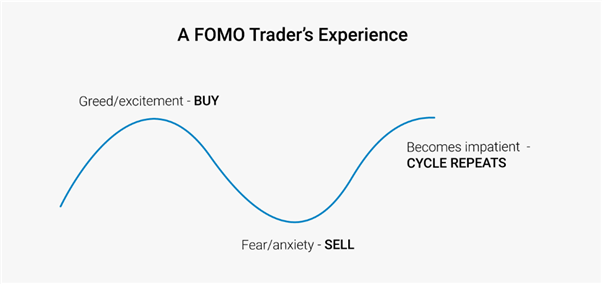
Trading Psychology: Beyond the Basics
The psychology of trading is often overlooked but forms a crucial part of a professional trader’s skillset. is the perfect place to learn how to manage your emotions and hone your trading psychology; our analysts have already experienced the ups and downs, so you don’t have to.
Keep reading to discover their top tips, and to learn more about:
- What is trading psychology
- How to get in the mindset of a successful trader
- The basics of trading psychology
- Trading psychology tools and techniques
Learn more about the realities of trading in our ‘ Day in the Life of a Trader ’ videos.
Unsure of what trading style to employ? Discover your niche with our DNA FX Quiz !
What is Trading Psychology?
Trading psychology is a broad term that includes all the emotions and feelings that a typical trader will encounter when trading. Some of these emotions are helpful and should be embraced while others like fear, greed , nervousness and anxiety should be contained. The psychology of trading is complex and takes time to fully master.
In reality, many traders experience the negative effects of trading psychology more than the positive aspects. Instances of this can appear in the form of closing losing trades prematurely, as the fear of loss gets too much, or simply doubling down on losing positions when the fear of realizing a loss turns to greed.
One of the most treacherous emotions prevalent in financial markets is the fear of missing out, or FOMO as it is known. Parabolic rises entice traders to buy after the move has peaked, leading to huge emotional stress when the market reverses and moves in the opposite direction.
Traders that manage to benefit from the positive aspects of psychology, while managing the bad aspects, are better placed to handle the volatility of the financial markets and become a better trader.
The Basics of Trading Psychology
Managing emotions
Fear, greed, excitement, overconfidence and nervousness are all typical emotions experienced by traders at some point or another. Managing the emotions of trading can prove to be the difference between growing the account equity or going bust.
Understanding FOMO
Traders need to identify and suppress FOMO as soon as it arises. While this isn’t easy, traders should remember there will always be another trade and should only trade with capital they can afford to lose.

Avoiding trading mistakes
While all traders make mistakes regardless of experience, understanding the logic behind these mistakes may limit the snowball effect of trading impediments. Some of the common trading mistakes include: trading on numerous markets, inconsistent trading sizes and overleveraging.
Overcoming greed
Greed is one of the most common emotions among traders and therefore, deserves special attention. When greed overpowers logic, traders tend to double down on losing trades or use excessive leverage in order recover previous losses. While it is easier said than done, it is crucial for traders to understand how to control greed when trading .
Importance of consistent trading
New trades often tend to look for opportunities wherever they may appear and get lured into trading many different markets, with little or no regard for the inherent differences in these markets. Without a well thought out strategy that focuses on a handful of markets, traders can expect to see inconsistent results. Learn how to trade consistently .
“Trade according to your strategy, not your feelings” – Peter Hanks , Junior Analyst

Debunking Trading Myths
As individuals we are often influenced by what we hear and trading is no different. There are many rumours around trading such as: traders must have a large account to be successful, or that to be profitable, traders need to win most trades. These trading myths can often become a mental barrier, preventing individuals from trading.
Get clarity on forex trading truths and lies from our analysts.
Implementing risk management
The significance of effective risk management cannot be overstated. The psychological benefits of risk management are endless. Being able to define the target and stop loss , up front, allows traders to breathe a sigh of relief because they understand how much they are willing to risk in the pursuit of reaching the target. Another aspect of risk management involves position sizing and its psychological benefits:
“ One of the easiest ways to decrease the emotional effect of your trades is to lower your trade size ” – James Stanley , DFX Currency Strategist

How to Get in the Mindset of a Successful Trader
While there are many nuances that contribute to the success of professional traders, there are a few common approaches that traders of all levels can consistently implement within their particular trading strategy .
1) Bring a positive attitude to the markets every day . This may seem obvious, but in reality, keeping a positive attitude when speculating in the forex market is difficult, especially after a run of successive losses. A positive attitude will keep your mind clear of negative thoughts that tend to get in the way of placing new trades.
2) Put aside your ego. Accept that you are going to get trades wrong and that you may even lose more trades than you win. This may seem like all bad news but with discipline and prudent risk management , it is still possible to grow account equity by ensuring average winners outweigh the average losses.
3) Do not trade for the sake of trading. You can only take what the market gives you. Some days you may place fifteen trades and in other instances you may not place a single trade for two weeks. It all depends what is happening in the market and whether trade set ups – that align with your strategy – appear in the market.
“Trade decisions are not binary, long vs short. Sometimes doing nothing is the best trade you can make” – Ilya Spivak , Senior Currency Strategist

4) Do not get despondent. This may seem similar to the first point but actually deals with thoughts of quitting. Many people see trading as a get rich quick scheme when in fact, it is more of a journey of trade after trade. This expectation of instant gratification often leads to frustration and impatience. Remember to stay disciplined and stay the course and view trading as a journey.
Trading Psychology Tools and Techniques
At we have a whole library of content dedicated to the psychology in trading. Take some time to work through the following topics:
- Listen to our podcast on how to create a trading plan
- Learn how to create and maintain a trading journal
- Avoid the #1 mistake traders make by adopting the traits of successful traders
- Setting a stop loss instead of a mental stop loss is a great way to avoid runaway losses.
